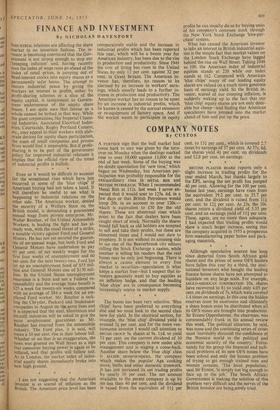COMPANY NOTES
By CUSTOS
A FURTHER sign that the bull market had come back to stay was given by the turn- over on Monday when the dealings marked rose to over 18,000 against 13,000 at the end of last week. Some of the buying was no doubt speculation for 'new time,' which began on Wednesday, but American par- ticipation was probably responsible for the extraordinary rises in METAL BOX and BRITISH PETROLEUM. When I recommended Metal Box at 112s. last week I never ex- pected that it would soar to 125s. 64. in a few days or that British Petroleum would Jump 20s. in an account to over 120s.— wbich is equivalent to £30 for the old shares. These are abnormal rises which point to the fact that dealers have been caught short of stock. Normally the shares would fall back as old holders are tempted to sell and take their profits, but these are abnormal times and I would not dare to prophesy. It is not without its amusing side to see one of the Beaverbrook city editors calling the Stock Exchange a casino, while another is telling his readers that the real boom may be only just beginning. There is always a casino element to every free market in securities—speculation is what keeps a market free—but I suspect that in- vestors genuinely want to buy equities as an inflation hedge, and that the leading :blue chips' are in consequence becoming increasingly scarce in market supply.
The boom has been very selective. 'Blue chips' have been preferred to everything else and we must look to the second class now for yield. In the electrical section, for example, the 'blue chip' dividend yield is around 3+ per cent, and for the more ven- turesome investor I would call attention to BRUSH GROUP 5s. shares at 9s. 11d. to yield 51 per cent. on the current dividend of 10 per cent. This company is now under able management and is staging a come-back. Another share below the 'blue chip' class is ALLIED IRONFOUNDERS, the company which makes the popular Aga cooking stove, baths and other domestic ironwork. It has just increased its net trading profits by nearly 30 per cent. The net amount available to the parent company is up by no less than 40 per cent, and the dividend is raised from the equivalent of 111 per
cent. to 131 per cent. which is covered 2.7 times by earnings of 37 per cent. At 57s. 6d. the shares yield 41 per cent. on dividends and 12.8 per cent, on earnings.
BRITISH PLASTER BOARD reports only a slight increase in trading profits for the year ended March, but thanks largely to the EPL saving the net profit has jumped 4() per cent. Allowing for the 100 per cent. bonus last year, earnings have risen from the equivalent 19.2 per cent. to 25.7 per cent. and the dividend is raised from 111 per cent. to 121 per cent. At 23s. the 10s. shares return a dividend yield of 5.35 per cent, and an earnings yield of Ill per cent. These, again, are no more than adequate. I had expected that trading profits would show a much larger increase, seeing that the company acquired in 1953 a prosperous firm manufacturing paper boxes and pack- aging materials.
Although speculative interest has long since departed from South African gold shares and the prices of some OFS leaders have fallen this year by a third, the insti- tutional investors who bought the leading finance house shares have not attempted to liquidate on any large scale. For example, ANGLO-AMERICAN CORPORATION 10s. shares have recovered to 81 to yield only 4.05 per cent. on dividends of 7s. which were covered 1.4 times on earnings. In this case the hidden reserves must be enormous and ultimately a share bonus must be distributed when all its OFS mines are brought into production. Sir Ernest Oppenheimer, the chairman, was commendably frank in his annual review this week. The political situation, he said, was tense and the continuing series of crises must 'inevitably diminish the confidence of the Western world in the political and economic security of the country.' Fortu- nately for his group the financial and tech- nical problems of its new OFS mines have been solved and only the human problem of trying to get enough trained men and women remains. 'The local population,: said Sir Ernest, Is simply not big enough to face up to the job.' The South African Government is making the solution of this problem very difficult and the nerves of the British investor are being,sorely tried.

















































 Previous page
Previous page